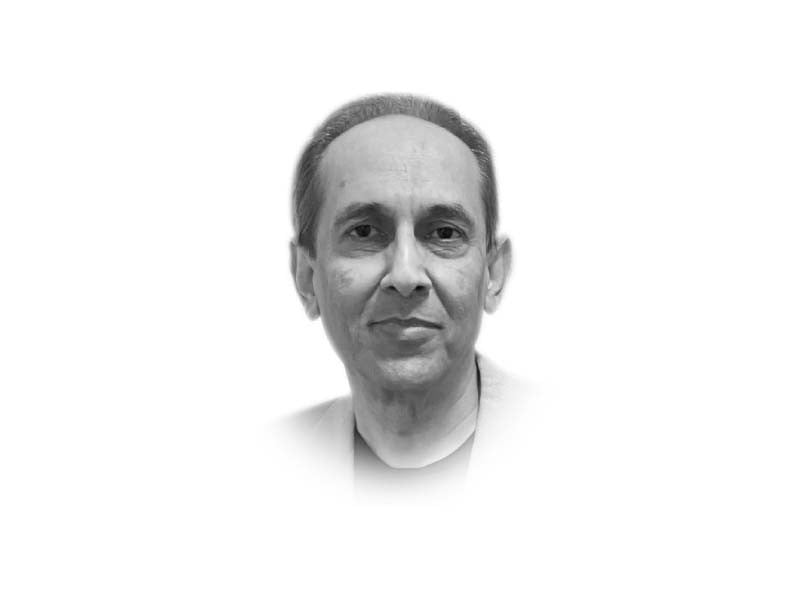As the undemocratic fabric of our democratic institutions is unraveling right before our eyes, we feel betrayed by our politicians, the judiciary, the bureaucracy and the military alike. This is no longer about misgovernance by the present government or the blatant hypocrisy of Imran Khan. The dagger has been cast deep into our psyche. Our collective consciousness is shaken. Our zeitgeist is bruised. But no one is talking about the elephant in the room — the existential crisis we must confront: intellectual starvation. We have committed the most brutal murder of all: we have killed critical thinking and creativity. In a short story by Arthur Conan Doyle, Sherlock Holmes asserts: “I’m a brain, Watson. The rest of me is a mere appendix.”
Our romance with mediocrity must end. The powers that be in Pakistan (and we know who they are) are hell bent on maintaining the status quo that feeds into their greed and lust for power. This self-serving cadre of elite would much rather build their mansions in exclusive neighborhoods and enjoy memberships to country clubs than commit to a just society. Their children end up in schools and colleges in England and USA, while our children, half of them stunted and suffering from malnutrition, aimlessly roam the streets in the scorching heat of summer. These bourgeois elite have denied us our basic human rights. They have cleverly clipped the wings of our imagination. Anyone who questions the status quo is immediately labeled as a traitor or a heretic.
Giordano Bruno was an Italian mathematician and cosmologist who advanced the Copernican model of the universe, namely, that the Earth was not the centre of the Universe but instead, it was one of many planets that revolved around the Sun. He also purportedly denied belief in Trinity and the divinity of Jesus. In 1592, he was arrested, incarcerated and tortured for seven years at the orders of the Roman Inquisition, a policing wing of the Roman Catholic Church. In 1600, he was burned at the stake. Thirty-three years later, Galileo Galilei, described by Einstein as the Father of Modern Science, faced the same Roman Inquisition for the same crime. Suspected of heresy, Galileo did not wish to meet the same fate as Bruno. To avoid the death penalty, he was forced to abandon his scientific views and to recant his work.
When Europe was in the clutches of the Dark Ages, later the Middle Ages, many Muslim scholars thrived in their intellectual pursuits. Al Kindi not only translated Greek philosophy and scientific literature into Arabic, he also introduced Indian numerals to the Arab world and later they erroneously became known as Arabic numerals. He adopted the Aristotelian thinking that truth must be confirmed by observation. Ibn Rushd (Averroes) famously introduced Greek philosophy, Aristotle in particular, to the Western World. He also criticised the inadequacies of other philosophers, especially al Ghazali, the author of Incoherence of Philosophers. Ibn Rushd took a swipe at al Ghazali when he wrote Incoherence of the Incoherence. Later ignored by the Muslim world, his writings had a far-reaching influence in the West. His commentaries on Aristotle left an indelible impact on the greatest Christian philosopher Thomas Aquinas among others. These intellectual battles on different fronts laid the groundwork for a movement in art, culture and science from the Dark Ages to Modernity called the Renaissance.
Leonardo da Vinci’s Vitruvian Man is a drawing that epitomises Renaissance. The nude man, when his arms are stretched out on each side, is inscribed in a perfect square; when his arms are stretched sideways and upwards and his legs are set apart, he’s inscribed in a perfect circle. Such intensity of focus on human body was perhaps an extension of Protagoras’ precept that “man is the measure of all things”. This did not imply that man was the centre of the universe but rather each person was important and had his or her own experiences and opinions. Renaissance humanism stressed the importance of reasoning and empirical evidence and the ability of human mind to reach extraordinary intellectual heights. Renaissance was spearheaded by the genius of Ibn Khaldun, Rene Descartes, Copernicus and Galileo, Ibn Rushd, John Milton, Raphael, Michelangelo, Dante and Shakespeare.
The West embraced the Age of Enlightenment. The Muslim World, on the other hand, clung to dogma and suffered stagnation, even retrogressed. As of 2021, only thirteen Muslims had won a Nobel Prize. Only three in science: two in Chemistry and one in Physics. And three in Literature. It will not surprise me if someone out there has a conspiracy theory as to why, in contrast, Jewish people have won around 200 Nobel Prizes. It’s the mindset. It’s the realisation that a world class university education starts at kindergarten or preschool.
Brian Greene, a Jewish theoretical physicist and a string theorist, fondly talks about his son and his daughter whom he used to tell science stories at bedtime. One night, when he told his 4-year-old son about spaceships zooming pretty fast but obviously not faster than the speed of light, his son interrupted, “But dad, what about the speed of dark?” Greene also recalls holding his 3-year-old daughter in his arm once and telling her that he loved her more than anything in the universe when she looked at him and said, “Dad, the universe or the multiverse?”
Yes, it all starts early. We as parents and teachers ought to foster critical thinking and creativity in our children. Unfortunately, we inherited a patriarchal system where the father or the patriarch is always right even when he’s wrong. It’s a society where we’re not allowed to question authority. Will we continue to let intellectual starvation suffocate us as a nation or are we ready to cultivate an open-minded society for our children and our future? Will our run-of-the-mill universities ever compete with Harvard and Oxford? Let’s start asking the right questions.





